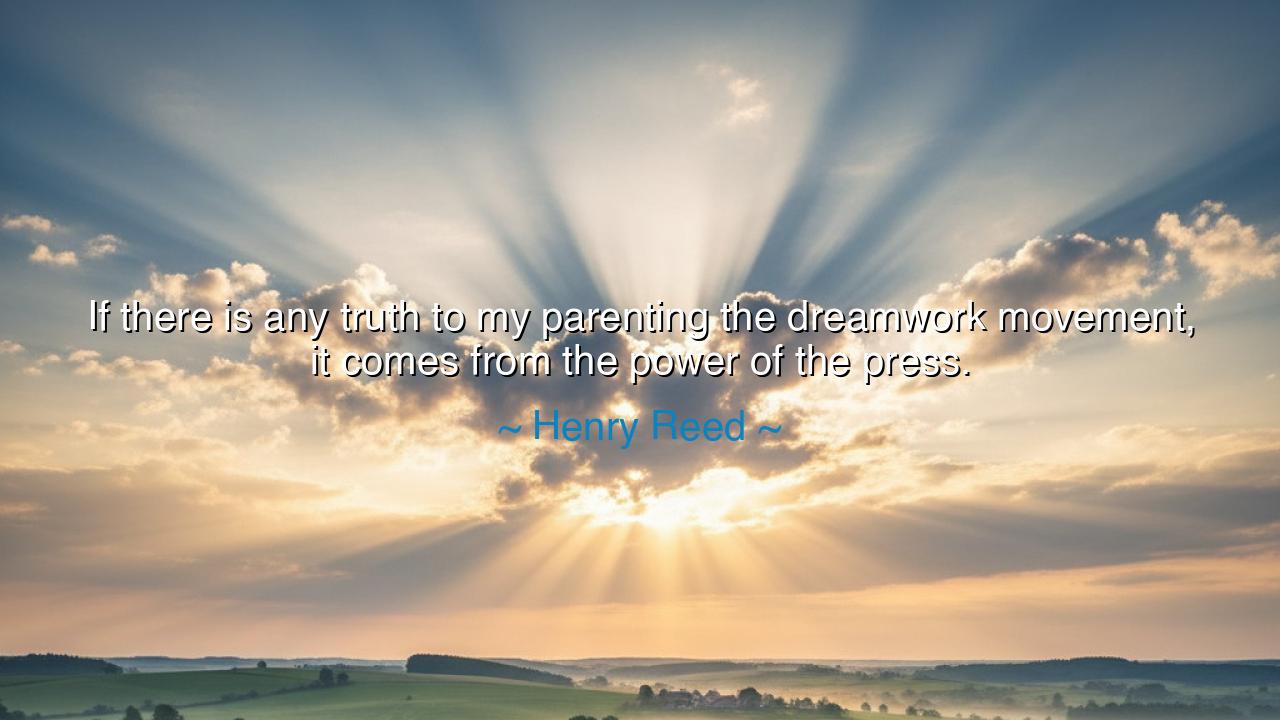
If there is any truth to my parenting the dreamwork movement, it
If there is any truth to my parenting the dreamwork movement, it comes from the power of the press.






In the words of Henry Reed, poet and thinker, we hear a reflection on legacy and influence: “If there is any truth to my parenting the dreamwork movement, it comes from the power of the press.” These words, though humble, speak of how ideas take root in the world—not through force, nor through solitary invention, but through the spreading of words, through the echo of print, and through the hands of those who carry teachings forward. Reed acknowledges that his role was not of a tyrant father, dictating the growth of a movement, but of a gentle parent whose child found its way into the world through the strength of storytelling and publication.
The ancients knew the sacred power of words. The Egyptians carved wisdom upon stone so that eternity itself might remember. The Greeks gathered in the agora to hear philosophers whose words traveled farther than their footsteps ever could. The Hebrews preserved their histories in scrolls that outlived kings and empires. The press, in Reed’s time, was the continuation of this ancient truth: that ideas survive not by remaining hidden, but by being given voice, multiplied, and sent into the hands of many. Thus, his “parenting” of the dreamwork movement did not arise from personal dominance, but from the amplifying chorus of publication.
Consider the story of Sigmund Freud, who too became a kind of “parent” to the psychoanalytic movement. His ideas of dreams as gateways to the unconscious might have died in obscurity had they not been printed, debated, and carried across Europe and beyond. It was not Freud alone, but also the power of the press, that gave his dream theories life and breath beyond his study. In Reed’s words, we hear the echo of this same phenomenon: ideas need both parents and messengers. Without the press, a thought may flicker and die; with it, a movement may be born.
Reed’s humility also points to a deeper wisdom: that no one truly owns a movement. A parent brings forth life, but once the child breathes, it belongs to the world. Likewise, Reed acknowledges that his role in the dreamwork movement was not solitary creation, but nurturing through publication. Here is the paradox of intellectual parenthood: the parent cannot control how the child grows, yet their hand is forever visible in the foundation. This humility is itself a lesson, for it teaches us not to cling to glory, but to rejoice in the flowering of seeds we once planted.
The lesson for us is this: ideas, like children, need both conception and communication. It is not enough to dream privately; one must share those dreams, publish them, speak them, and let them circulate in the world. At the same time, one must be humble, knowing that once ideas are shared, they may grow in unexpected directions. To parent a movement, then, is not to command it, but to release it, trusting that truth, if it is truth, will find its way.
What, then, must we do? First, we must tend carefully to the ideas we nurture, ensuring they are guided by wisdom and compassion before releasing them into the world. Second, we must honor the tools of communication—the modern press, in all its forms—for it remains the river by which ideas reach distant shores. Third, we must remain humble, recognizing that our role may be to spark, not to control, the growth of something larger than ourselves.
O seekers of truth, remember this: words are not fleeting breath, but seeds. When carried by the wind of the press, they can root in the hearts of countless strangers and grow into forests we may never walk ourselves. Reed’s acknowledgment that his parenting of the dreamwork movement came through such power is a reminder to us all: speak, write, share, for the world is shaped not only by warriors and kings, but by those whose words endure.
Thus the teaching endures: if you wish to parent a movement, do not seek control, but clarity. Do not hoard your thought, but let it flow outward. Trust the strength of words and the enduring power of the press. For as Reed teaches, our ideas, once spoken, belong not to us alone, but to the world—and in the world, they may grow into legacies greater than we can ever imagine.






AAdministratorAdministrator
Welcome, honored guests. Please leave a comment, we will respond soon